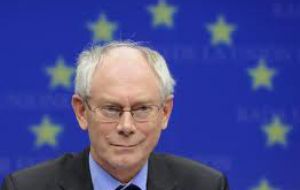MercoPress. South Atlantic News Agency
Euro zone agrees (strict conditionality) bail out permanent mechanism
 EU President Herman Van Rompuy: ‘whatever is required to protect the currency’
EU President Herman Van Rompuy: ‘whatever is required to protect the currency’ European Union leaders have agreed to set up a permanent mechanism to bail out any member state whose debt problems threaten the 16-nation Euro zone.
The Euro zone stability mechanism will require a change to the EU's Lisbon Treaty - but the wording has now been agreed, diplomats say. EU President Herman Van Rompuy said leaders were ready to do whatever was required to protect the currency.
This year Greece and the Irish Republic have received emergency EU bail-outs.
The 27 leaders, meeting in Brussels on Thursday, agreed that in 2013 the permanent mechanism would succeed the Euro zone's 750 billion Euro temporary bail-out fund, the European Financial Stability Facility (EFSF).
“We stand ready to do whatever is required to ensure the financial stability of the Euro zone as a whole,” Mr Van Rompuy told a news conference.
European Commission President Jose Manuel Barroso said it was “a big day for Europe” and leaders must now put their words into action. “Our task now is to hold a course - walk, not talk - and prove those wrong who predicted the demise of our common currency.”
The agreement says “member states whose currency is the Euro may establish a stability mechanism, to be activated if indispensable to safeguard the stability of the Euro as a whole”.
But any Euro zone country requiring such an injection of emergency aid must act to tackle its debt or deficit, the statement adds. “The granting of any required financial assistance under the mechanism will be made subject to strict conditionality,” the text says.
Diplomats said the agreed wording - two sentences - would be inserted into the Lisbon Treaty. The treaty change can be approved through a simplified procedure, EU officials say.
That means the EU should avoid any repeat of the wrangling and referendums that plagued the treaty negotiations for years.
The new mechanism will require private sector bondholders to share the cost of any debt restructuring on a case-by-case basis, Reuters news agency reports.
Germany’s PM Angela Merkel had pushed for a change to the Lisbon Treaty to make Euro zone bail-outs legal - but only as a last resort.
The summit comes amid continuing concern about stability in the Euro zone, as national debts and deficits have soared above the EU targets. Portugal and Spain have been under financial market scrutiny since the Irish Republic was forced to take an aid package of 85 billion Euros
Meanwhile the European Central Bank (ECB) has been buying billions of Euros of sovereign debt to ease the pressure on the countries seen as most vulnerable in the Euro zone. It is to double the reserves it holds - to 10.8bn euros, from 5.8bn euros at present.
It is requesting the cash from the 16 national central banks in the Euro zone, and it is the first time it has asked them for such a cash injection.
The EU has recently bought billions of Euros of Euro zone government bonds, particularly from the most indebted countries, such as Greece, Portugal and the Republic of Ireland.
It has done so to help limit the rise in the interest rates the governments have to offer to reluctant buyers when they issue their bonds.
The ECB said the increase in its funds “was deemed appropriate in view of increased volatility in foreign exchange rates, interest rates and gold prices, as well as credit risk”.




Top Comments
Disclaimer & comment rulesCommenting for this story is now closed.
If you have a Facebook account, become a fan and comment on our Facebook Page!